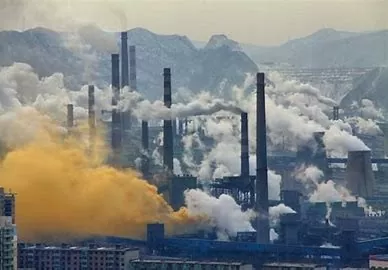Experts accuse the fossil fuel industry of seeking special privileges, arguing that greenhouse gas emissions from oil fields should be treated differently.
Should greenhouse gas emissions from oil fields be treated differently?
Lobbyists argue that it is unfair for the fossil fuel industry to be treated the same as other industries, because the end product, oil and gas, inevitably produces emissions.
Experts have accused the fossil fuel industry of seeking special treatment after lobbyists argued that greenhouse gas emissions from oil fields should be treated differently to other industries.
The UK government is locked in a debate over whether to allow the giant new Rosebank oil field to go ahead, with some arguing it could boost growth, while others fear it could hamper the goal of achieving net zero emissions by 2050.
 |
| The fossil fuel industry enjoys special government privileges in the form of trillions of dollars in subsidies and tax breaks globally. Illustration photo |
The UK Labour Party pledged in its agenda to stop licensing new oil fields in the North Sea, but Rosebank and several other projects had already been licensed and were awaiting final approval when the party won the general election.
The documents show that Offshore Energies UK (OEUK), the industry group representing companies and organisations operating in the UK offshore energy sector, is demanding that scope 3 emissions (including all indirect emissions arising from a business's activities but not directly controlled or owned by it, across the entire supply chain) from Rosebank and other oil fields, those arising from the burning of produced oil and gas, be treated differently because that is a core objective of its business.
A recent lawsuit has concluded that the permit granted to Rosebank by the previous government was illegal because it did not take these emissions into account.
Ed Miliband, Britain's energy secretary, is now deciding how companies will respond to a landmark Supreme Court ruling, which last year said oil and gas companies must account for scope 3 emissions from burning extracted fossil fuels, rather than just greenhouse gases from building the structures.
A consultation is underway to set out the guidance these companies will receive from the government on the issue, which will determine whether fossil fuel permits granted by the previous government can continue.
OEUK has submitted a petition to the government, arguing that its industry is different from others in that its end products, oil and gas, inevitably generate scope 3 emissions, as the end result is almost always the burning of these fossil fuels. They suggest that the government's draft guidance needs to take this into account.
OEUK considers that the draft guidance fails to take into account the relatively unique nature of oil and gas projects, namely that the purpose of such a project is to produce hydrocarbons primarily for use, through combustion, as an energy source. This aspect of oil and gas projects should be recognised as relevant when approaching Environmental Impact Assessments (EIAs) and environmental statements.
The biggest contributor to climate change
The oil and gas industry argues that it is unfair to treat them the same as other industries, such as car manufacturers, because cars can reduce their scope 3 emissions through more efficient engines, whereas a barrel of oil or a tonne of gas cannot reduce emissions by burning them. Accordingly, since gas will be used as an energy source for decades to come, it should not be excluded from production because of scope 3 emissions.
However, climate experts say this should not be a mitigating factor, as the aim of scope 3 emissions assessments is to prevent excessive carbon emissions, such as those from burning fossil fuels.
“ The fossil fuel industry is a major contributor to climate change and scope 3 emissions account for the vast majority of its planet-warming pollution,” said Patrick Galey, senior fossil fuel investigator at the international NGO Global Witness.
“ This is an industry that has enjoyed privileges from governments in the form of trillions of dollars in subsidies and tax breaks globally. It is incredible that the industry now has the audacity to ask for additional emissions privileges .”
“Oil and gas producers claim they are innocent because their products pollute, as if they have no role in spending billions of dollars each year to produce them. If the industry truly cared about carbon emissions, it would make a rapid and equitable transition away from fossil fuels. Instead, it seems determined to change the rules so that it continues to emit climate-damaging pollutants ,” Galey added.
Tessa Khan, founder of Uplift, the group that won the case against Rosebank, said: “ As the courts have found, flaring of oil and gas in projects like Rosebank and the resulting carbon emissions is unavoidable. It is therefore vital that any assessment of the environmental impact of new oil and gas fields focuses on the climate impact of flaring the oil and gas they contain. The primary purpose of these projects is to extract and burn the resources .”
| The oil and gas industry argues that it is unfair to treat them the same as other industries, such as car manufacturers, because cars can reduce scope 3 emissions through more efficient engines, whereas a barrel of oil or a ton of gas cannot reduce emissions by burning them. Accordingly, since gas will be used as an energy source for decades to come, it should not be excluded from production because of scope 3 emissions. |
Source: https://congthuong.vn/cong-nghiep-nhien-lieu-hoa-thach-yeu-cau-dac-quyen-khi-thai-375040.html



![[Photo] Parade to celebrate the 50th anniversary of Laos' National Day](/_next/image?url=https%3A%2F%2Fvphoto.vietnam.vn%2Fthumb%2F1200x675%2Fvietnam%2Fresource%2FIMAGE%2F2025%2F12%2F02%2F1764691918289_ndo_br_0-jpg.webp&w=3840&q=75)


![[Photo] Worshiping the Tuyet Son statue - a nearly 400-year-old treasure at Keo Pagoda](/_next/image?url=https%3A%2F%2Fvphoto.vietnam.vn%2Fthumb%2F1200x675%2Fvietnam%2Fresource%2FIMAGE%2F2025%2F12%2F02%2F1764679323086_ndo_br_tempimageomw0hi-4884-jpg.webp&w=3840&q=75)










































![[Video] Protecting World Heritage from Extreme Climate Change](https://vphoto.vietnam.vn/thumb/402x226/vietnam/resource/IMAGE/2025/12/03/1764721929017_dung00-57-35-42982still012-jpg.webp)































































Comment (0)